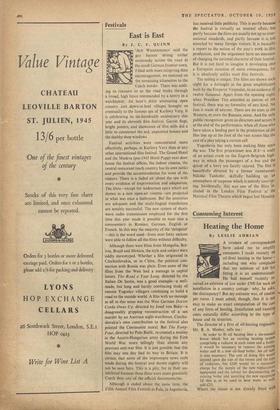Festivals
East is East
By J. C. F. QUINN
`AUF WIEDERSEHEN' said the gay banner strung rather ominously across the road at the small German frontier town. Filled with more misgiving than encouragement, we motored on the remaining kilometres to the Czech border. There was noth- ing to reassure us as the road broke through a broad, high fence commanded by a sentry in a watchtower. An hour's drive alternating open country and down-at-heel villages brought us eventually to the famous spa of Karlovy Vary. It is celebrating its six-hundredth anniversary this year and its eleventh film festival. Garish flags, bright posters, and showcases of film stills did a little to counteract the sad, unpainted houses and the shabby shop windows.
Festival activities were concentrated more effectively, perhaps, at Karlovy Vary than at any other international film festival. The Grand Hotel and the Moskva (pre-1945 Hotel Pupp) next door house the festival offices, the indoor cinema, the central restaurant (each country has its own table) and provide the accommodation for most of the visitors. There is a faded air about the spa with every evidence of improvisation and adaptation. The films—except for widescreen epics which are shown in a new open-air cinema—are projected in what was once a bathroom. But the amenities are adequate and the multi-lingual translations are notably successful. The new system of short- wave radio transmission employed for the first time this year made it possible to tune into a commentary in Russian, German, English. or French. In this way the majority of the 'delegates' —this is the word used—from over forty nations were able to follow all the films without difficulty.
Although there were films from Mongolia, Bol- ivia, Brazil and Mexico, the style and subject were oddly stereotyped. Whether a film originated in Czechoslovakia, or in China, the political con- nection with Russia was plain. Even some of the films from the West had a message in capital letters. The Road a Year Long, directed by the Italian De Santis, was a good example—a well- made, but long and barely convincing study of remote Yugoslav villagers combining to build a road to the outside world. A film with no message at all in this sense was the West German Doctor Corda Owns Up, directed by Josef von Baky—a disagreeably gripping reconstruction of a sex murder by an Austrian night-watchman. Czecho- slovakia's own contribution to the festival also pointed the Communist moral. But The Forty- Four, directed by Palo Bielik, re-created a mutiny in the Austro-Hungarian army during the First World War more tellingly than almost any previous anti-war film. It is just possible that this film may one day find its way to Britain. It is certain that some of the impromptu news reels made during the festival and shown nightly will not be seen here. This is a pity, for in their un- inhibited humour these films were more genuinely Czech than any of the official documentaries.
Although it ended about the same time, the Fifth Annual Film Festival at Pula, in Jugoslavia, has received little publicity. This is' partly because the festival is virtually an internal affair, but partly because the films are usually not up to inter- national standards, and partly because it is, not attended by many foreign visitors. It is basically a report to the nation of the year's work in film production, and the organisers have no intention of changing the national character of their festival. But it is not hard to imagine it developing into a European occasion of some consequence, for it is absolutely unlike most film festivals.
The setting is unique. The films are shown each night for a fortnight in the great amphitheatre built by the Emperor Vespasian, to an audience of twelve thousand. Apart from the opening night, when President Tito attended as patron, of the festival, there was no formality of any, kind. No fuss is made of anyone. There are no stars in the Western, or even the Russian, sense. And the only public recognition given to directors and actors is at the end of the performance, when all those who have taken a leading part in the production of the film line up at the foot of the vast screen like the cast of a play taking a curtain call.
Yugoslavia has only been making films since the war. The first prizewinner was H.8—a study of an actual crash on the Zagreb-Belgrade high- way in which the passengers of a bus and the driver of a lorry are fatally injured. The film is beautifully directed by a former cameraman, Nikolai Tanhofer, skilfully building up an atmosphere of suspense which is entirely convinc- ing. Incidentally, this was one of the films in- cluded in the London Film "Festival at the National Film Theatre which began last'MondaY.


































 Previous page
Previous page